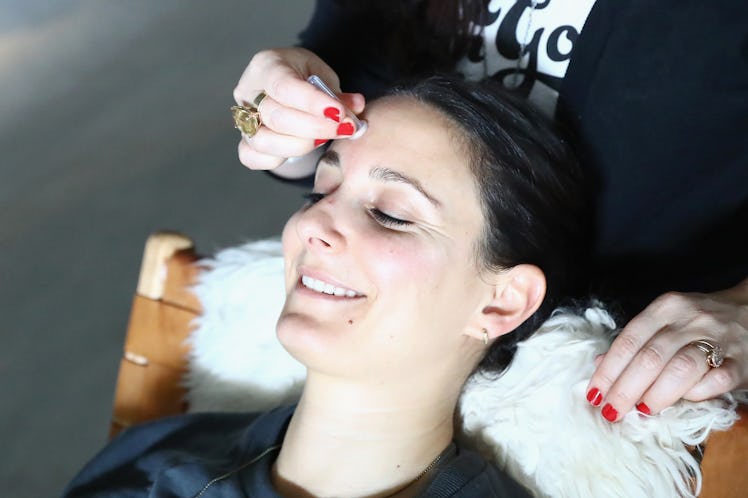
Here Are All The Surprising Ways The Foods You Eat Can Affect Your Skin For Better Or Worse
Whether you're a beauty fanatic, or you use a three-in-one body wash to cleanse your face in the shower, the truth is that, overall, your skin health does matter. Although many people deal with a variety of skin issues — and genetics has a lot to do that — one major way we can help to manage our own skin health is by considering how our diet affects our skin. Excessive greasy meals like pizza are known to lead to breakouts and other skin ailments, but there are many unsuspecting foods, like certain dairy products, that can also make your face and body spazz out. To find out more on what types of foods might be the culprit behind certain skin issues and what food might be able to help, I asked a few dermatologists to share their insight.
Now, please keep in mind that how your diet affects your skin can be subjective — some people are just naturally more sensitive to certain ingredients than others. But if you've been dealing with a certain skin problem for quite some time, it's definitely worth seeing if omitting some of these foods makes a difference.
Dr. Cindy Yoon Soo Bae, of the Laser & Skin Surgery Center of New York, tells Elite Daily that, while family history plays a major role when it comes to skin, certain diets can definitely make things worse. "There is one study from China where they collected information from their patients, which showed a correlation between ingestion of sweet and spicy foods with oily skin," she shares, noting, however, that since the data gathered was self-reported, there's a strong chance of bias. "We are noticing that foods like milk and high glycemic index (GI) foods may have a role in acne in some populations."
Shape reports that foods such as white bread or bagels, watermelon, and even instant oatmeals can all have high GIs. But what exactly are high GI foods doing to your skin below the surface? "Diets high in high GI foods are thought to change the composition of our oil secretions, making them less fluid and more 'sticky,'" says Dr. Rachel Nazarian, of Mount Sinai's Department of Dermatology. "[This] encourages them to adhere to skin cells under the skin and create pimples, rather than flow normally to the skin pore."
If you're someone who often craves sweets, that could also be wreaking havoc on your skin, both right now and in the future, according to New York City-based dermatologist Dr. Joshua Zeichner. "High sugar levels not only may lead to acne breakouts but may be involved in premature aging," he explains. "As sugars attach to collagen, it can lead to a hardening process known as glycation." In other words, glycation can cause early wrinkles and skin sagging over a period of time.
While those are the foods that should generally be avoided if you're looking to prioritize skin health, on the flip side, Dr. Bae says various studies have proven that foods high in eicosapentaenoic acid (EPA) and antioxidants can help to improve the appearance of skin overtime. According to Livestrong, foods like fish, seaweed, flaxseeds, and walnuts are all high in EPA, which is a beneficial source of omega-3 fatty acids. Dr. Bae also adds that if you're not able to make those types of food a part of your regular diet, you can always opt for a vitamin A or omega-3 supplement, as well as a topical cream, like Differin Adapalene Gel 0.1% Acne Treatment, to help treat blemishes at the surface.
Dr. Zeichner suggests eating leafy green vegetables to help balance out the skin and keep it healthy. He also says that zinc — which can be found in foods like oysters, fortified cereals, chickpeas, and cashews — has also been known to "help reduce inflammation and may be beneficial for people who suffer from acne." In addition, phytonutrients, which are plants' natural defense against the sun and are found in a variety of fruits, teas, whole grains, and beans, according to Healthline, can help as well, according to Dr. Bae.
So, while everyone has different genes, allergies, and dietary restrictions, if you're looking to achieve optimal skin health, try making some changes to your diet to see if it makes a difference. Hopefully, you'll end up being pleasantly surprised. But if you've been mindful of your eating and that hasn't made much of a difference for you, it's always best to visit a dermatologist, who can come up with a specialized skincare plan just for you.